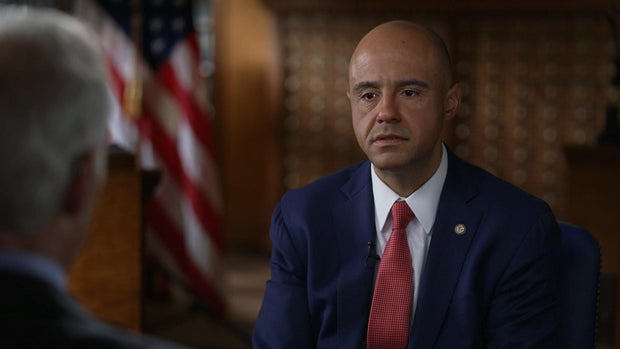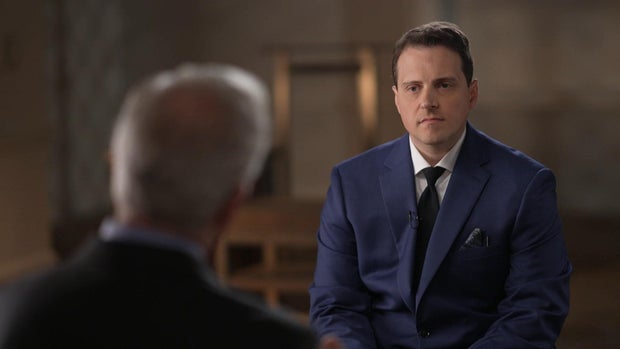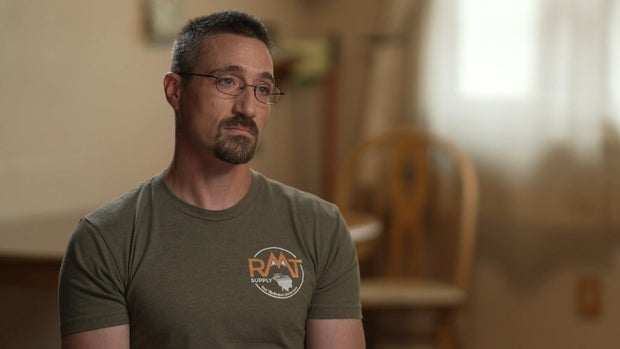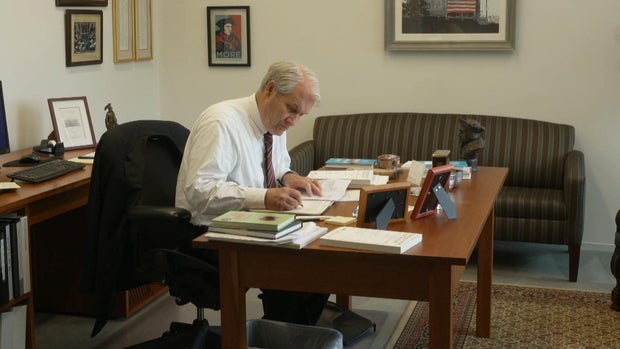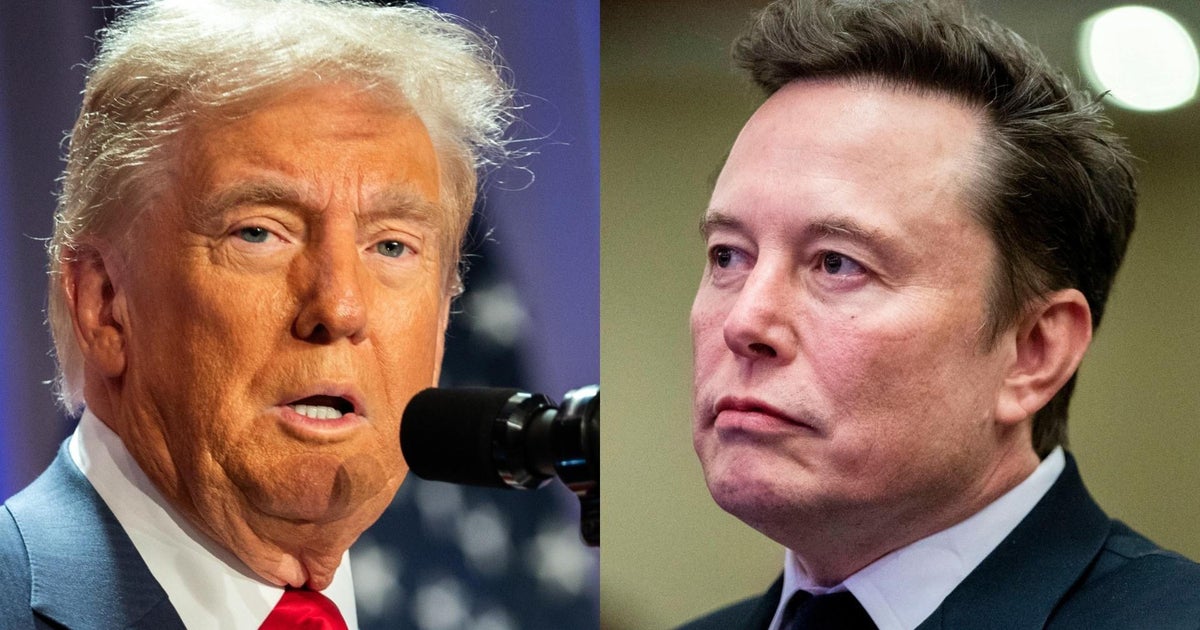CBS News
U.S. attorney explains Jan. 6 Capitol riot prosecutions

More than 1,000 Americans have been convicted in the January 6th, 2021 attack on the Capitol. About 350 trials are still pending and the FBI continues its dragnet for suspects. The attack that stopped the count of the presidential vote triggered the largest prosecution in U.S. history. But now, history is being challenged. Former President Donald Trump calls the convicted, “patriots” worthy of pardons. What is the evidence? We begin with the prosecutor in charge. U.S. Attorney Matthew Graves told us what drives the prosecution of January 6th.
Matthew Graves: The crime was severe. It was an attack on our democracy. Once you replace votes and deliberation with violence and intimidation, you’ve lost the democratic process. You’ve lost the rule of law. But it’s also about the victims, the officer victims who were injured that day, and making sure we hold people accountable for the harm that they inflicted on the 140 officers who reported physical injury.
Matthew Graves has worked in the Bush and Biden Justice Departments. Now, as U.S. attorney for the District of Columbia, he’s won more than 1,000 January 6th convictions and lost only two of the cases at trial.
Scott Pelley: What is the best evidence that you’ve had?
Matthew Graves: The crimes that occurred that day are probably the most recorded crimes in all of our history. You also have the words of the defendants explaining what they were going to do or what they had done.
60 Minutes
Evidence from the trials show many in the mob were determined to stop the count of the electoral vote that would certify Joe Biden’s victory. They were enraged by President Trump’s false claims of a stolen election.
Scott Pelley: You must’ve felt strongly to drive 2,000 miles to Washington.
Jerod Hughes: Yes, sir. I still feel very strongly.
Jerod Hughes came from Montana. He’s a married, 39-year-old construction worker with a daughter and a grievance.
Jerod Hughes: The way this country’s headed, my paycheck– you know, my wife’s disabled, and it’s been hell for us to try to, you know, try to make it with the tens of thousands of dollars of medical bills, you know? And a lot of us see Donald Trump, the outsider, comin’ in and tryin’ to– and tryin’ to help us out, tryin’ to help the little guy out against the big government.
That’s Jerod Hughes at lower right in the khaki cap, among the first inside the Capitol. That’s Hughes, inside, at the door, kicking it out so the mob can rush in.
Jerod Hughes: You guys don’t want this. You don’t f***ing want this! And we are f***ing mad! We are mad!
Jerod Hughes: No matter how I look at it, I share some of the responsibility for everything that happened that day, letting people in, being a part of that mob. I didn’t personally fight any cops or engage with any officers, but I have a lot of family that are police officers. I have a tremendous amount of respect for police, and I did not like seeing them being assaulted.
Scott Pelley: We didn’t see a lot of respect for police in that video.
Jerod Hughes: Well, no. Absolutely. I mean, I’ll hold my hand up and say I was wrong. I should not have been screaming at those cops. It’s not somethin’ I’m proud of.
Others did much worse.
Daniel Hodges: I became trapped. They pinned me against the door frame, and with my arms at my side I couldn’t mount any kind of defense.
Officer Daniel Hodges of D.C.’s Metropolitan Police defended an entrance known as the West Front Tunnel.
60 Minutes
Daniel Hodges: Someone was pinning me with a police shield, and another member of the crowd grabbed my gas mask by the filter in front and just started essentially punching me in the face while holding onto it, and then eventually ripped it off my head-And then he stole my riot baton out of my hands and beat me in the head with it.
Scott Pelley: What were you defending?
Daniel Hodges: Democracy.
Democracy stopped for about six hours. The vote was counted at 3:44 a.m. With two weeks until inauguration day, it was the Trump Justice Department that set the standards for the prosecutions. Decisions were made by “career” prosecutors who work at Justice for years regardless of who the president might be.
Matthew Graves: The career prosecutors quickly realized that you needed guidelines in place, determinations about who was gonna be charged, who wasn’t gonna be charged, and what they would be charged with. That process started in January 7th, 2021, during the prior administration. To this day, we continue to use guidelines that the career prosecutors put in place during the prior administration.
Scott Pelley: And how do they guide you?
Matthew Graves: what we’re generally focusing on, of the thousands of people who you could potentially charge that day, are people who actually entered into the Capitol, people who engaged in violent or destructive behavior, people who illegally carried firearms or other weapons on Capitol grounds, and people who helped others to get into the Capitol building.
Scott Pelley: You’re not charging everyone who was there that day?
Matthew Graves: That is correct. We have turned down hundreds of cases where the FBI is saying, there is evidence here, it’s your determination, prosecutors, whether you think this should be prosecuted.
Scott Pelley: And why would you turn them down?
Matthew Graves: Because they don’t fit within the guidelines that the career prosecutors had been using, or we don’t think that there’s sufficient evidence to prove the case beyond a reasonable doubt.
U.S. Attorney Matthew Graves told us that January 6th charges range from, essentially, trespassing, to the most serious, seditious conspiracy.
Matthew Graves: So seditious conspiracy is a Civil-War era statute that deals with basically using force against the government to interfere with the operations of the government.
Fourteen have been convicted of seditious conspiracy. One, a militia leader, got 22 years, the longest sentence of all. All of the trials have been in open court in Washington before judges or juries, the defendant’s choice. but more than 900 — 80% — have pleaded guilty.
Matthew Graves: And we’ve seen defendants in January 6th take full advantage of all the protections afforded under the constitution. To me, that’s the picture of due process.
But “due process” is not the picture painted at Trump rallies, including this last March.
Announcer: “Ladies and gentlemen, please rise for the horribly and unfairly treated January 6th hostages.” “Oh, say can you see by the dawn’s early light…” “At the twilight’s last gleaming…”
That’s a recording of defendants in jail. Mr. Trump has said that he’s “inclined to pardon many of them.”
Former President Donald Trump (during March 2024 rally): Well, thank you very much and you see the spirit from the hostages and that’s what they are, is hostages, they’ve been treated terribly and very unfairly, and you know that and everybody knows that and we are going to be working on that, soon as, the first day we get into office, we’re going to save our country we are going to work with the people to treat those unbelievable patriots and they were unbelievable patriots and are…
The former president has also revised the history of those who died.
One of his supporters was killed by an officer defending the House chamber. Three other Trump supporters died that day—one drug overdose—two from cardiovascular disease. And a police officer died of a stroke the next day. In the debate, Mr. Trump acknowledged one death, but he said this in August.
Former President Donald Trump (during August news conference:) When you compare them to other things that took place in this country where a lot of people were killed. Nobody was killed on January 6th.
Former President Trump is, himself, a January 6th defendant in a separate prosecution led by Special Counsel Jack Smith. Trump was indicted by a grand jury for allegedly conspiring to overturn the election with lies he knew were false -the same myths that stoked rage in Jerod Hughes.
60 Minutes
Scott Pelley: Where were you getting all of this information?
Jerod Hughes: Well, a lot of Fox News, a lot of stuff that I read on the internet. Obviously, Trump himself, you know, saying that the election was stolen.
Fox News paid $787 million to settle a suit that claimed that Fox repeatedly lied about the election and knew it.
Scott Pelley: Were the January 6th protesters duped?
Thomas Griffith: Yes.
Thomas Griffith is a conservative, retired, federal judge who co-authored, “Lost, Not Stolen,” a year-long investigation by conservatives into the 2020 election.
Thomas Griffith: The conclusion of the report was that there’s no evidence that fraud changed the outcome of an election in any precinct in the United States of America.
Scott Pelley: In any precinct?
Thomas Griffith: And all of the evidence, not the speculation, not the conspiracy theories, all the evidence points in one direction. And that is that President Biden won, and President Trump lost.
Judge Griffith was appointed by George W. Bush to the Court of Appeals for the D.C. Circuit. He retired in 2020 after working for years with most of the 29 judges who have heard January 6th cases.
Thomas Griffith: None of these judges is politically biased. These defendants had every chance in the world to defend themselves against these charges. And they didn’t succeed.
Scott Pelley: You seem to be saying that justice was done.
Thomas Griffith: Absolutely, justice was done.
60 Minutes
Justice for Jerod Hughes meant turning himself in and pleading guilty to obstruction of an official proceeding. The Supreme Court struck down that charge in another case. But if Hughes appeals, he’ll face other charges that prosecutors dropped. So, after 20 months in custody, including prison, he’s decided to just wrap up his last days of home detention.
Jerod Hughes: If I come to find out that I was dead wrong on this, that the election was actually legit and Joe Biden got the most votes in presidential history, I would be extremely embarrassed. I would hold my hand up and say, “I was wrong, and I was an idiot.” I don’t believe that though. And whether I was right or wrong, I– I believe what we did was patriotic, because we truly believed that the election was stolen, for a number of reasons. We really believed that.
Though the vote count was delayed, the transfer of power was on time with a new president emerging from that same West Front Tunnel defended by Officer Daniel Hodges.
Daniel Hodges: If these defendants are pardoned, then so much of what they believe or believed on that day will be justified in their heads that if they do it again that they’ll be protected. And it would be just incredibly destructive for the fabric of the country.
Now, the trials, themselves, will be judged by voters who will decide whether the defendants were prosecuted as criminals or choir boys.
Scott Pelley: The allegation is made that the White House is guiding your work.
Matthew Graves: I’ve never met President Biden let alone talked to him which is normal I would add because there are walls for very good reasons between the Department of Justice and the White House so that prosecution can focus on what it should be focused on, whether there are violations of law, and whether those violations of law consistent with the rules that we follow should be federally prosecuted.
Scott Pelley: There are people, maybe millions of people in this country, who are skeptical about what you just said.
Matthew Graves: No one is being prosecuted for their views. They’re being prosecuted for their acts.
Editor’s Note: D.C. Metropolitan police officer Daniel Hodges spoke in his personal capacity and not on behalf of his employer or the District of Columbia.
Produced by Aaron Weisz. Associate producer, Ian Flickinger. Broadcast associates, Michelle Karim. Edited by Daniel J. Glucksman.
CBS News
Biden’s top hostage envoy Roger Carstens in Syria to ask for help in finding Austin Tice
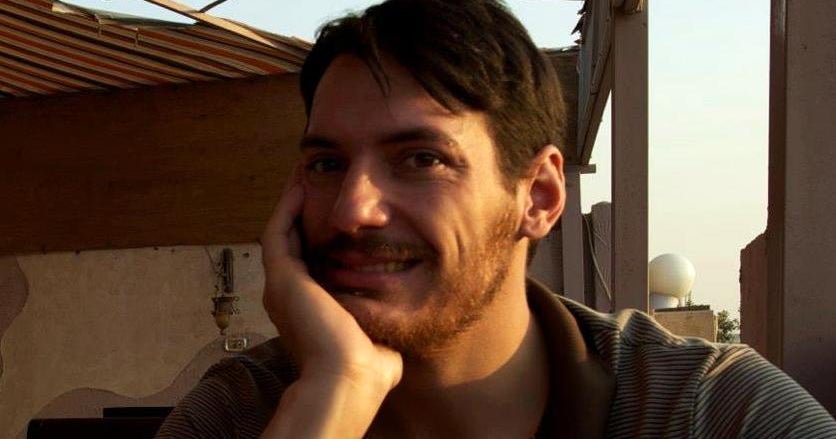
Roger Carstens, the Biden administration’s top official for freeing Americans held overseas, on Friday arrived in Damascus, Syria, for a high-risk mission: making the first known face-to-face contact with the caretaker government and asking for help finding missing American journalist Austin Tice.
Tice was kidnapped in Syria 12 years ago during the civil war and brutal reign of now-deposed Syrian dictator Bashar al-Assad. For years, U.S. officials have said they do not know with certainty whether Tice is still alive, where he is being held or by whom.
The State Department’s top diplomat for the Middle East, Barbara Leaf, assistant secretary of state for Near Eastern Affairs, accompanied Carstens to Damascus as a gesture of broader outreach to Hay’at Tahrir al-Sham, known as HTS, the rebel group that recently overthrew Assad’s regime and is emerging as a leading power.
Near East Senior Adviser Daniel Rubinstein was also with the delegation. They are the first American diplomats to visit Damascus in over a decade, according to a State Department spokesperson.
They plan to meet with HTS representatives to discuss transition principles endorsed by the U.S. and regional partners in Aqaba, Jordan, the spokesperson said. Secretary of State Antony Blinken traveled to Aqaba last week to meet with Middle East leaders and discuss the situation in Syria.
While finding and freeing Tice and other American citizens who disappeared under the Assad regime is the ultimate goal, U.S. officials are downplaying expectations of a breakthrough on this trip. Multiple sources told CBS News that Carstens and Leaf’s intent is to convey U.S. interests to senior HTS leaders, and learn anything they can about Tice.
Rubinstein will lead the U.S. diplomacy in Syria, engaging directly with the Syrian people and key parties in Syria, the State Department spokesperson added.
Diplomatic outreach to HTS comes in a volatile, war-torn region at an uncertain moment. Two sources even compared the potential danger to the expeditionary diplomacy practiced by the late U.S. Ambassador Christopher Stevens, who led outreach to rebels in Benghazi, Libya, in 2012 and was killed in a terrorist attack on a U.S. diplomatic compound and intelligence post.
U.S. special operations forces known as JSOC provided security for the delegation as they traveled by vehicle across the Jordanian border and on the road to Damascus. The convoy was given assurances by HTS that it would be granted safe passage while in Syria, but there remains a threat of attacks by other terrorist groups, including ISIS.
CBS News withheld publication of this story for security concerns at the State Department’s request.
Sending high-level American diplomats to Damascus represents a significant step in reopening U.S.-Syria relations following the fall of the Assad regime less than two weeks ago. Operations at the U.S. embassy in Damascus have been suspended since 2012, shortly after the Assad regime brutally repressed an uprising that became a 14-year civil war and spawned 13 million Syrians to flee the country in one of the largest humanitarian disasters in the world.
The U.S. formally designated HTS, which had ties to al Qaeda, as a foreign terrorist organization in 2018. Its leader, Mohammed al Jolani, was designated as a terrorist by the US in 2013 and prior to that served time in a US prison in Iraq.
Since toppling Assad, HTS has publicly signaled interest in a new more moderate trajectory. Al Jolani even shed his nom de guerre and now uses his legal name, Ahmed al-Sharaa.
U.S. sanctions on HTS linked to those terrorist designations complicate outreach somewhat, but they haven’t prevented American officials from making direct contact with HTS at the direction of President Biden. Blinken recently confirmed that U.S. officials were in touch with HTS representatives prior to Carstens and Leaf’s visit.
“We’ve heard positive statements coming from Mr. Jolani, the leader of HTS,” Blinken told Bloomberg News on Thursday. “But what everyone is focused on is what’s actually happening on the ground, what are they doing? Are they working to build a transition in Syria that brings everyone in?”
In that same interview, Blinken also seemed to dangle the possibility that the U.S. could help lift sanctions on HTS and its leader imposed by the United Nations, if HTS builds what he called an inclusive nonsectarian government and eventually holds elections. The Biden administration is not expected to lift the U.S. terrorist designation before the end of the president’s term on January 20th.
Pentagon spokesperson Pat Ryder disclosed Thursday that the U.S. currently has approximately 2,000 US troops inside of Syria as part of the mission to defeat ISIS, a far higher number than the 900 troops the Biden administration had previously acknowledged. There are at least five U.S. military bases in the north and south of the country.
The Biden administration is concerned that thousands of ISIS prisoners held at a camp known as al-Hol could be freed. It is currently guarded by the Syrian Democratic forces, Kurdish allies of the U.S. who are wary of the newly-powerful HTS. The situation on the ground is rapidly changing since Russia and Iran withdrew military support from the Assad regime, which has reset the balance of power. Turkey, which has been a sometimes problematic U.S. ally, has been a conduit to HTS and is emerging as a power broker.
A high-risk mission like this is unusual for the typically risk averse Biden administration, which has exercised consistently restrained diplomacy. Blinken approved Carstens and Leaf’s trip and relevant congressional leaders were briefed on it days ago.
“I think it’s important to have direct communication, it’s important to speak as clearly as possible, to listen, to make sure that we understand as best we can where they’re going and where they want to go,” Blinken said Thursday.
At a news conference in Moscow Thursday, Russian President Vladimir Putin said he had not yet met with Assad, who fled to Russia when his regime fell earlier this month. Putin added that he would ask Assad about Austin Tice when they do meet.
Tice, a Marine Corps veteran, worked for multiple news organizations including CBS News.
CBS News
12/19: CBS Evening News – CBS News

Watch CBS News
Be the first to know
Get browser notifications for breaking news, live events, and exclusive reporting.
CBS News
Delivering Tomorrow: talabat’s Evolution in the Middle East

Watch CBS News
Be the first to know
Get browser notifications for breaking news, live events, and exclusive reporting.


